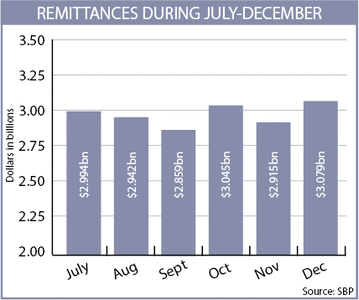KARACHI: Remittances through exchange companies remained robust during the first half of the current fiscal year (FY25), with $2 billion sold to banks and an additional $2bn in the open market.
Pakistan is on track to receive $35bn in total remittances through banks by the end of FY25, with inflows already showing a 33 per cent increase in the first half compared to the previous year.
According to bankers, a stable exchange rate and a government crackdown on illegal currency trade have significantly contributed to the rise in remittances. The open market, previously a hub for unauthorised currency dealings, saw substantial improvement following the 2023 crackdown, benefiting both banks and exchange companies.
“The situation has improved as we have sold $2bn to banks in the first half of the current fiscal year and expect the same amount in the next half,” said Zafar Paracha, general secretary of the Exchange Companies Association of Pakistan (ECAP).
He said exchange companies also sold $2bn in the open market during the same period, indicating no significant shortage of dollars. A major portion of these funds — around $800 million — was allocated for Haj expenses, along with other major expenditures, including travel, education, immigration, and medical needs.
“The inflows would increase further if the State Bank provides exchange companies with the same incentives offered to banks,” said Mr Paracha. Currently, banks earn Rs2 per dollar in remittances, while exchange companies receive Rs1 per dollar. “We are in discussions with the government and are optimistic about achieving parity in incentives,” he added.
Remittances from overseas Pakistanis remain the country’s largest source of foreign exchange earnings. Despite a modest improvement in exports this year, they are still projected to lag significantly behind remittances.
During FY24, remittances through banks amounted to $30.25bn, with exchange companies contributing $3.8bn. The ongoing rise in remittances reflects increased confidence in the formal financial system, partly attributed to the crackdown on illegal currency trade.
Published in Dawn, January 17th, 2025















































